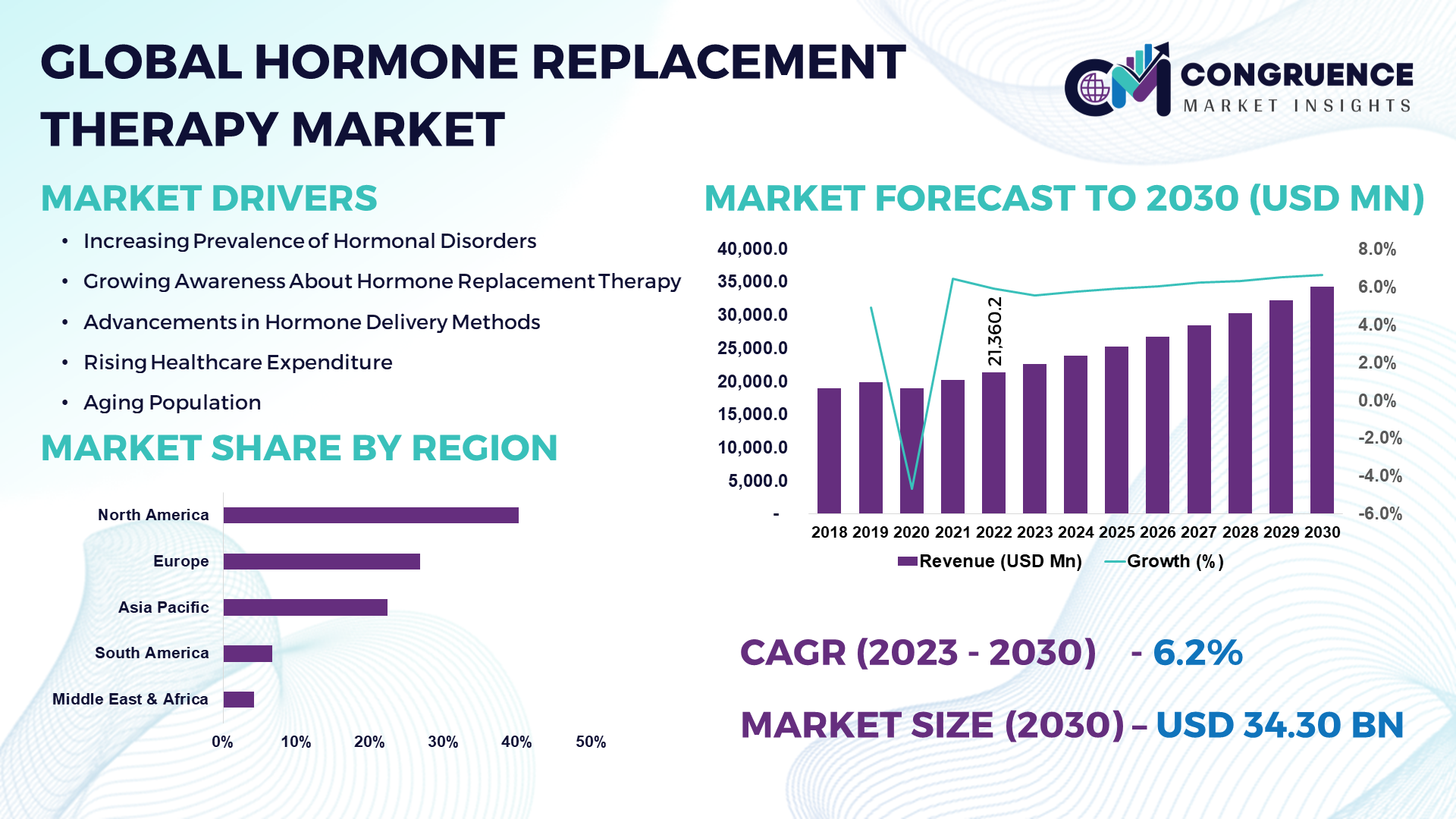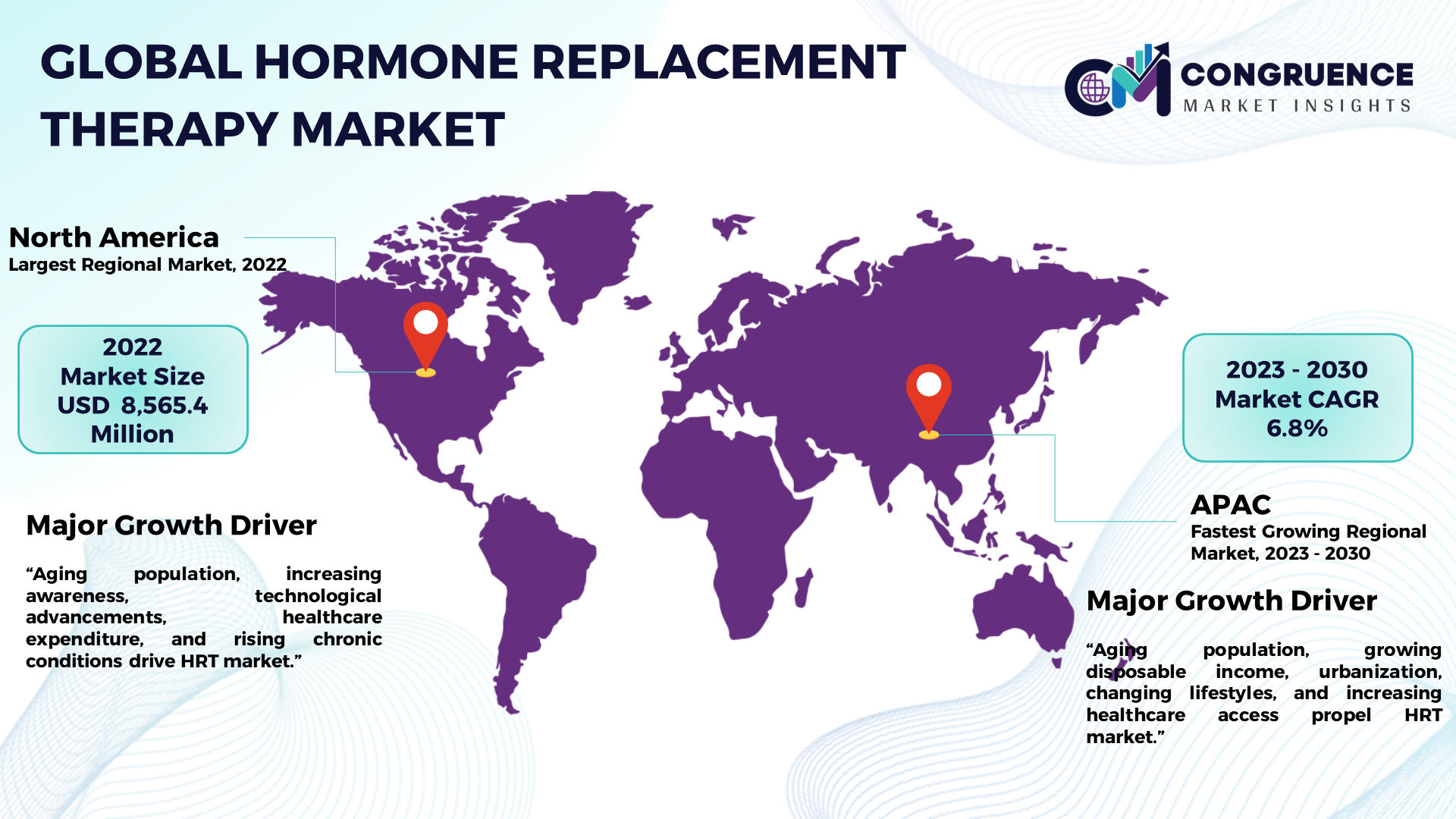Reports
The Global Hormone Replacement Therapy (HRT) Market was valued at USD 21,360.2 Million in 2022 and is projected to reach USD 34,301.9 Million by 2030, growing at a CAGR of 6.2% from 2023 to 2030. Hormone replacement therapy involves the administration of hormones to supplement or replace hormones that are deficient or no longer produced by the body. This therapy is primarily used to manage symptoms associated with hormonal imbalance, such as those experienced during menopause, hypothyroidism, male hypogonadism, and growth hormone deficiency, among others. The market is driven by factors such as the increasing prevalence of hormonal disorders, growing awareness about hormone replacement therapy, advancements in hormone delivery methods, and rising healthcare expenditure. Additionally, the market is witnessing significant growth in the Asia Pacific region, driven by factors such as increasing healthcare infrastructure, rising disposable incomes, and growing awareness about hormonal health.

Hormone Replacement Therapy Market Major Driving Forces
Increasing Prevalence of Hormonal Disorders: The rising prevalence of hormonal disorders, such as menopause, hypothyroidism, and male hypogonadism, is driving the demand for hormone replacement therapy. Factors such as aging population, lifestyle changes, and environmental factors contribute to the increasing incidence of hormonal imbalances, fueling market growth.
Growing Awareness About Hormone Replacement Therapy: There is a growing awareness among healthcare professionals and patients about the benefits of hormone replacement therapy in managing hormonal imbalances and associated symptoms. Increased awareness campaigns, educational initiatives, and patient advocacy efforts contribute to the growing acceptance and adoption of hormone replacement therapy, driving market growth.
Advancements in Hormone Delivery Methods: Technological advancements in hormone delivery methods, such as oral, parenteral, and transdermal routes of administration, have led to improved efficacy, safety, and convenience of hormone replacement therapy. These advancements enhance patient compliance and satisfaction, driving market growth.
Rising Healthcare Expenditure: Increasing healthcare expenditure, coupled with expanding healthcare infrastructure and insurance coverage, supports the adoption of hormone replacement therapy. Growing investments in healthcare facilities, medical research, and development of innovative hormone therapies contribute to market growth.
Aging Population: The aging population worldwide is a significant demographic factor driving the demand for hormone replacement therapy. As individuals age, hormonal imbalances become more prevalent, leading to increased demand for therapies that address these imbalances and improve quality of life, thereby driving market growth.
Hormone Replacement Therapy Market Key Opportunities
Expansion of Indications: There is a growing opportunity to expand the indications for hormone replacement therapy beyond traditional uses such as menopause and hypothyroidism. Emerging indications such as male hypogonadism, growth hormone deficiency, and hormonal imbalances associated with chronic conditions present untapped opportunities for market expansion.
Personalized Hormone Therapy: The trend towards personalized medicine presents an opportunity to develop tailored hormone replacement therapies based on individual patient characteristics, genetic factors, and hormonal profiles. Personalized hormone therapy offers improved efficacy, safety, and patient outcomes, driving market growth.
Technological Innovations: Advances in technology, such as novel drug delivery systems, hormone formulations, and diagnostic tools, create opportunities to develop innovative hormone replacement therapies with enhanced efficacy, convenience, and patient compliance.
Emerging Markets: The growing prevalence of hormonal disorders in emerging markets, coupled with increasing healthcare spending and improving access to healthcare, presents opportunities for market expansion in regions such as Asia Pacific, Latin America, and Middle East & Africa.
Hormonal Health Awareness: Increasing awareness about hormonal health and the importance of early diagnosis and treatment of hormonal imbalances create opportunities to expand the market for hormone replacement therapy. Educational campaigns, patient advocacy efforts, and healthcare initiatives contribute to raising awareness and driving market growth.
Hormone Replacement Therapy Market Key Trends
· Bioidentical Hormone Therapy: Bioidentical hormone therapy, which uses hormones that are structurally identical to those produced by the human body, is gaining popularity due to perceived safety and efficacy compared to synthetic hormones.
· Transdermal Hormone Delivery: Transdermal hormone delivery systems, such as patches and gels, are becoming increasingly popular due to their convenience, ease of use, and ability to provide sustained hormone levels.
· Customized Hormone Formulations: There is a trend towards customized hormone formulations tailored to individual patient needs and preferences, allowing for personalized hormone replacement therapy regimens.
· Integrative Hormone Therapy: Integrative approaches to hormone therapy, which combine hormone replacement with lifestyle modifications, dietary changes, and complementary therapies, are gaining traction as a holistic approach to hormonal health management.
· Hormone Therapy for Men: The use of hormone replacement therapy in men, particularly for conditions such as male hypogonadism and andropause, is a growing trend driven by increasing awareness and acceptance of hormonal imbalances in men.

Region-wise Market Insights
North America dominates the Hormone Replacement Therapy Market with a leading market share of 40.1% in 2022, driven by factors such as the high prevalence of hormonal disorders, increasing awareness about hormone replacement therapy, and well-established healthcare infrastructure. Asia Pacific emerges as the fastest-growing region with a projected CAGR of 6.8% during the forecast period, fueled by factors such as the growing aging population, rising prevalence of hormonal disorders, increasing healthcare expenditure, and improving access to healthcare. Europe and Latin America also offer significant growth opportunities, driven by factors such as increasing healthcare spending, growing awareness about hormonal health, and expanding indications for hormone replacement therapy. The Middle East & Africa region is expected to witness steady growth, supported by improving healthcare infrastructure and rising awareness about hormonal disorders.
Segment-wise Market Analysis
· Estrogen hormone type dominates the Hormone Replacement Therapy Market, driven by its widespread use in managing symptoms associated with menopause and hormonal imbalances in women.
· Hospital pharmacies are the preferred distribution channel for hormone replacement therapy products, offering accessibility and professional guidance to patients.
· Menopause application segment represents the largest market share, driven by the increasing prevalence of menopausal symptoms and the growing aging population of women.
Market Competition Landscape
The Hormone Replacement Therapy Market is characterized by intense competition among key players striving to gain a competitive edge through various strategies. Product innovation, research and development activities, strategic partnerships, and geographical expansion are key strategies adopted by market players to strengthen their market presence and enhance their product offerings. Established players leverage their brand reputation, extensive distribution networks, and strong R&D capabilities to maintain their market position and drive growth. Emerging players focus on introducing innovative formulations, expanding their product portfolios, and forging strategic collaborations to gain a foothold in the competitive market landscape.
E-commerce and online retailing platforms have emerged as key distribution channels, offering market players opportunities to reach a wider customer base and enhance their market penetration. Moreover, increasing consumer preference for natural and sustainable products has led to a surge in demand for hormone replacement therapy derived from renewable sources, driving market players to invest in sustainable production methods and eco-friendly product offerings. Prominent players in the hormone replacement therapy market include:
· Novo Nordisk A/S
· Pfizer Inc.
· Bayer AG
· Eli Lilly and Company
· Novartis AG
· Merck & Co., Inc.
· Teva Pharmaceutical Industries Ltd.
· AbbVie Inc.
· Mylan N.V.
· Allergan plc
· Ferring Pharmaceuticals Inc.
· Amgen Inc.
· Endo International plc
· AstraZeneca plc
|
Report Attribute/Metric |
Details |
|
Market Revenue in 2022 |
USD 21,360.2 Million |
|
Market Revenue in 2030 |
USD 34,301.9 Million |
|
CAGR (2023 – 2030) |
6.2% |
|
Base Year |
2022 |
|
Forecast Period |
2023 – 2030 |
|
Historical Data |
2018 to 2022 |
|
Forecast Unit |
Value (US$ Mn) |
|
Key Report Deliverable |
Revenue Forecast, Growth Trends, Market Dynamics, Segmental Overview, Regional and Country-wise Analysis, Competition Landscape |
|
Segments Covered |
· By Hormone Type (Estrogen, Progesterone, Testosterone) · By Route of Administration (Oral, Transdermal, Others) · By Distribution Channel (Hospital Pharmacies, Retail Pharmacies, Online Pharmacies), · By Application (Menopause, Hypothyroidism, Male Hypogonadism, Growth Hormone Deficiency, Others) |
|
Geographies Covered |
North America: U.S., Canada and Mexico Europe: Germany, France, U.K., Italy, Spain, and Rest of Europe Asia Pacific: China, India, Japan, South Korea, Southeast Asia, and Rest of Asia Pacific South America: Brazil, Argentina, and Rest of Latin America Middle East & Africa: GCC Countries, South Africa, and Rest of Middle East & Africa |
|
Key Players Analyzed |
Novo Nordisk A/S, Pfizer Inc., Bayer AG, Eli Lilly and Company, Novartis AG, Merck & Co., Inc., Teva Pharmaceutical Industries Ltd., AbbVie Inc., Mylan N.V., Allergan plc, Ferring Pharmaceuticals Inc., Amgen Inc., Endo International plc, and AstraZeneca plc |
|
Customization & Pricing |
Available on Request (10% Customization is Free) |
